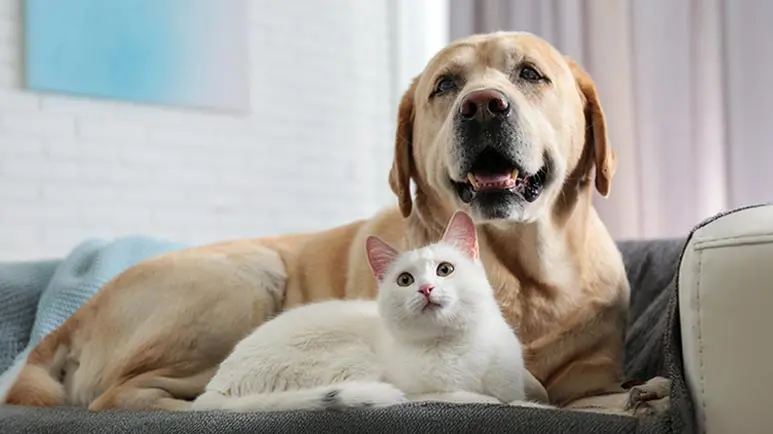Senior Pet Care Plan — How to Keep Your Aging Pet Feeling Their Best
When your pet reaches their senior years, taking proactive steps in their care becomes essential to help them stay strong, vibrant and comfortable well into their golden years.

STORY AT-A-GLANCE
- Aging brings physical and behavioral changes that impact your pets' health, making them more vulnerable to issues like joint pain, reduced energy and cognitive decline. Proactive care is essential for maintaining their quality of life
- Contrary to popular belief, your senior pets need more high-quality protein, so instead of reducing their protein intake, focus on providing them high-quality protein sources; adding supplement into their diet also helps fill nutritional gaps
- Aging pets need regular, low-impact physical activities, like walking, swimming, and gentle stretching, to help maintain muscle tone, improve joint mobility and support overall health
- Keep your pet’s mind active and help reduce their risk of age-related cognitive decline by offering plenty of mental stimulation and socialization through interactive toys, scent games and gentle, calming social interactions
- Schedule routine wellness checks for your pet twice a year to catch early signs of health issues before they progress. Consider getting pet insurance or a dedicated savings account to manage unexpected veterinary costs as they age
Animal companions grow from playful puppies and curious kittens to wise seniors in the blink of an eye. While it’s hard to believe how fast time flies, it’s important to focus on what can be done to keep them healthy and happy throughout their lives. Just like people, aging brings physical and behavioral changes that can affect your pet's quality of life.
It’s ideal to take early, proactive steps to support your pet’s health long before signs of aging emerge. For cats, the senior years start at age 11, while dogs are considered seniors around 7 years old. This is the perfect time to start a wellness plan to ensure that their second half of life is as joyful and comfortable as the first. With a few simple practices, you can help your aging pet continue to thrive well into their golden years.
Nourish Your Senior Pet with a Nutritious, Age-Appropriate Diet
A whole, unprocessed species-specific diet is the cornerstone of health for pets, regardless of their age. As your pet reaches their senior years, there are some adjustments you need to make to ensure that the food they eat helps them stay active, prevent age-related issues and maintain muscle mass.
One widespread misconception is that older dogs and cats require a low-protein diet. However, in reality, senior pets benefit from more high-quality protein, as it supports muscle strength, tissue repair and energy levels, all of which become essential in their later years.1
Instead of reducing protein, focus on its quality. Avoid ultraprocessed pet foods loaded with fillers and carbohydrates, as they offer empty calories that cause weight gain and put unnecessary stress on the organs. Instead, opt for fresh, digestible proteins from human-grade animal meat, as they’re gentler on aging kidneys and provide essential amino acids.
In addition to protein, moisture is vital in your aging pet’s diet. Senior pets can be prone to dehydration, especially if they eat mainly dry kibble, which can strain their kidneys and liver. Introducing moisture-rich foods — such as lightly cooked or raw diets — or adding water or low-sodium broth to their meals helps boost their hydration, making a significant difference in their overall health.
Consider Supplements to Help Support Overall Wellness
While a nutritionally optimal diet is the best source of vitamins and minerals for pets, having a supplement protocol may help fill dietary gaps, boost immunity, support mobility and combat oxidative stress. Some of the supplements that can be added to your pet’s health regimen include:2
- Vitamin and mineral complexes — A broad-spectrum vitamin and mineral supplement helps ensure that your senior pet receives a balanced intake of vital micronutrients.
- Digestive enzymes and probiotics — Aging can reduce the efficiency of your pet’s digestive system, making it harder to break down and absorb nutrients. Digestive enzymes can improve nutrient absorption by helping break down food more effectively, while probiotics help maintain a healthy gut microbiome, supporting your pet’s immune health and reducing inflammation.
- Omega-3 fats — Omega-3 fats, particularly EPA and DHA from fish or krill oil, provide powerful anti-inflammatory effects that help support joint health, skin and coat quality. They also enhance cognitive function, making them especially beneficial for senior pets with cognitive decline.
- Choline — This is an essential nutrient that supports brain health, helping to manage or slow cognitive decline in older pets. It also supports liver health, helping senior pets with liver or pancreatic conditions.
- Cannabidiol (CBD) — CBD oil helps manage pain, inflammation and anxiety in senior pets, without the side effects often associated with traditional pain medications. This is especially helpful for pets with arthritis, cancer or other chronic conditions. Make sure to use a veterinarian-approved product to ensure safety and efficacy.
- Alpha-lipoic acid and acetyl-L-carnitine — These powerful antioxidants help slow down mitochondrial decay and the effects of cellular aging. Research shows that in dogs, the combination of alpha-lipoic acid and acetyl-L-carnitine helped enhance memory and learning abilities.3 These compounds also protect cells from oxidative damage, support energy production and are especially helpful for pets showing signs of cognitive decline or low energy.
- SAMe (S-adenosylmethionine) — This compound works by boosting levels of certain brain chemicals that support mood and mental clarity. It also plays a role in maintaining liver health by supporting the liver’s natural detox processes, which can become less efficient as pets age.
- Joint support supplements — Supplements like glucosamine, chondroitin, ubiquinol and MSM (methylsulfonylmethane) help support cartilage, reduce inflammation and improve mobility in pets with arthritis or joint stiffness. Joint support supplements work best as a preventive measure, so starting them early in your pet’s senior years may help slow down joint degeneration and minimize discomfort.
Maintain Mobility with Regular Exercise and Stretching
While senior pets may not be able to play and exercise as vigorously as before, daily physical activity remains vital for maintaining their muscle tone, mobility and healthy weight. Walking, swimming and low-impact play are excellent ways to keep your pet moving without stressing their joints.
In addition to regular exercise, incorporating gentle stretching can make a big difference in your pet’s comfort and flexibility. Simple stretches focused on their hips, shoulders and spine may help relieve stiffness, especially for pets with degenerative joint diseases. Passive range-of-motion exercises, where you gently move your pet’s limbs through a full range of motion, are also helpful.
Other therapeutic options, such as massage, acupuncture and laser therapy, can go a long way toward improving your pet’s mobility by reducing inflammation and relieving pain associated with aging. Many senior pets thrive with personalized exercise and therapy plans created by a veterinary physical therapist, who can tailor movements and treatments to meet their specific needs.4
Provide Opportunities for Socialization and Mental Stimulation
Keeping your pet mentally active is key to reducing their risk of cognitive decline. Daily play sessions using interactive toys, treat-dispensing puzzles and scent games are fantastic ways to keep their mind sharp and engaged.
Socialization is equally important to help your pet feel connected and engaged with their surroundings. Gentle playdates, brief visits from friends or relaxed strolls in a familiar park provide meaningful social engagement without overwhelming them.
When outdoor activities are limited, creating an enriching indoor environment will help reduce boredom. Try rotating their toys, setting up different “exploration zones” with new scents or textures, and even placing a bird feeder near their favorite window to give them new experiences from the comfort of home.
Keep Them Comfortable and Stress-Free
Older pets are more prone to both physical and mental discomfort as they age. Joint stiffness, arthritis and muscle loss can make even simple activities challenging, while changes in routine or sensory abilities may cause increased anxiety or confusion. Preserving your pet’s comfort means caring for both their body and mind with thoughtful adjustments around your home.
Providing them with a soft, orthopedic bed with memory foam is one way to help relieve pressure on their joints, giving them the support they need for a restful night’s sleep and helping reduce morning stiffness. Placing ramps or stairs near their favorite spots, like the couch or bed, will also make it easier for them to get around without the strain of jumping, which can be hard on aging joints.
Mental comfort is just as important. Aging pets often benefit from a consistent daily routine, which helps reduce stress and makes them feel more secure. Small changes like sticking to regular feeding times, exercise and social interactions help provide structure. Creating cozy, quiet spaces within your home also allows them to retreat and feel calm if they experience sensory sensitivities or fatigue.
Schedule Regular Screenings for Early Disease Detection and Prevention
Regular testing is one of the most effective ways to catch potential health issues before they become serious, especially in senior pets who are more vulnerable to conditions like kidney disease, diabetes and heart problems. Routine blood tests, including a complete blood count (CBC) and biochemistry profile, offer insight into your pet’s overall health by monitoring organ function, blood sugar levels and immune system markers.
Urinalysis is another valuable tool, providing important information about kidney function, hydration and any signs of urinary tract infections. For pets prone to thyroid issues, a thyroid function test (T4) is essential to detect hypothyroidism, a common concern in aging dogs and cats. Dental exams should also be part of their routine checkups, as untreated dental disease can lead to infections that spread to the heart and kidneys.
Additionally, imaging tests such as X-rays and ultrasounds may help detect underlying issues like tumors, arthritis or organ abnormalities that may not be apparent during a physical exam. By scheduling a veterinary wellness exam twice yearly, you not only catch potential health concerns early but also provide your pet with the best chance at a longer, healthier life.5
Consider Getting a Pet Health Insurance
Pet health insurance can be a great way to manage the costs of your pet’s care, giving you peace of mind that they’ll receive the treatment they need when they need it. But finding the right plan takes some research to make sure it covers what’s important for your pet’s specific needs. Ideally, it’s best to enroll your pet before any age-related issues appear, as many insurance providers don’t cover pre-existing conditions, and some plans may exclude illnesses or injuries that often affect senior pets.
Since monthly premiums and deductibles can add up, it’s important to weigh the cost of coverage against what you expect to need. If you’re able to find a plan that fits your pet’s age, breed and health status, insurance can help offset unexpected veterinary expenses and allow you to focus on what’s best for your pet without financial stress.
If you can’t find a good pet insurance, consider setting up a dedicated pet health savings account instead. Setting aside the amount you’d otherwise spend on premiums each month can build an emergency fund over time, giving you a financial cushion for any unforeseen medical needs. Whether you go with insurance or a savings account, planning ahead ensures you’re prepared to provide the best care for your pet throughout their senior years.6











